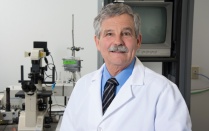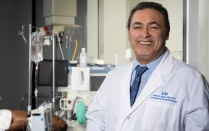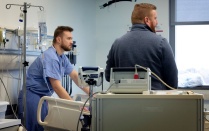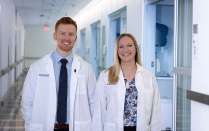Medical Student Education
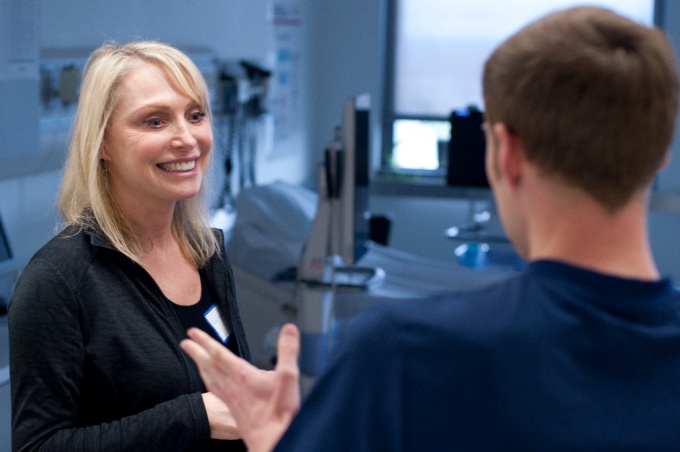
Rose Berkun, MD, director of anesthesia clerkships, leading UB medical students and anesthesia residents during a regional workshop.
When you train with our faculty, we’ll augment your understanding of anesthesiology, providing you with essential knowledge that you’ll tap throughout your career.
Medical students interested in completing an observership are encouraged to reach out directly to the hospital site where they wish to observe. This is not a course, this is simply observing with available UB Anesthesia Faculty.
Please coordinate directly with the site’s administrative team to initiate the approval process and arrange the observership experience.
| Site | Administrator | Contact Number |
|---|---|---|
| Buffalo General Medical Center (BGMC) / Gates Vascular Institute (GVI) | Courtney Mundy | 716-859-2220 |
| Golisano Children's Hospital | Dianne Adams and Megan Roemer | 716-323-6570 |
| Roswell Park Comprehensive Cancer Center | Karen Dallas | 716-845-5851 |
| VA Western NY Health Systems (VAWNYHS) | Heather Crumlish | 716-834-9200 ext. 24746 |
Anesthesiology Preceptorship for First- and Second-Year Medical Students
This non-clinical elective is designed as an introductory preceptorship for first- and second-year medical students interested in exploring the field of anesthesiology. The course offers students the opportunity to observe the practice of anesthesiology in a variety of clinical settings, including the operating room, preoperative area, and post-anesthesia care unit.
Each student is paired one-on-one with a faculty preceptor in the Department of Anesthesiology to gain direct exposure to the daily responsibilities and decision-making processes of an anesthesiologist. Over the course of the elective, students are required to complete a minimum of 12 hours of shadowing with their assigned preceptor.
The observership provides a structured introduction to the practice of anesthesiology, including key elements such as:
- Preoperative assessment and patient optimization
- Development of the anesthetic plan based on surgical and patient-specific considerations
- Intraoperative management, including airway management, hemodynamic monitoring, and anesthetic maintenance
- Emergence from anesthesia and safe handoff
- Postoperative care and pain management
While this is a non-clinical elective, students are expected to engage actively through observation and discussion, demonstrating professionalism and curiosity about the specialty.
At the conclusion of the elective, students are required to submit a brief written reflection on their experience, discussing insights gained and how the elective contributed to their understanding of anesthesiology. The preceptor will submit a written evaluation of the student’s participation to the medical school.
This is a Pass/Fail course, with successful completion based on participation, reflection submission, and preceptor feedback.
Anesthesia Elective for Third-and Fourth-Year Medical Students
This elective is designed to introduce third- and fourth-year medical students to the foundational principles and clinical practice of anesthesiology. The third-year medical students can take a two week elective in anesthesia as a part of their surgery rotation, The fourth-year medical students are offered a one month rotation in anesthesia. These courses provide an in-depth overview of the basic principles of anesthesia, including the pharmacology of commonly used anesthetic agents and their physiologic effects. Students will gain an understanding of the pathophysiology of common diseases encountered in surgical patients and how these conditions influence anesthetic planning and management.
The curriculum includes weekly didactic lectures covering topics such as the mechanisms of anesthesia, airway management, fluid and electrolyte balance, and pain control. Students will also attend monthly departmental Grand Rounds, where they will be exposed to current topics and case-based discussions presented by faculty and visiting experts.
Students will have clinical exposure to the practice of anesthesiology, including observation and participation in the induction, maintenance, and emergence phases of anesthesia. They will be involved in the preoperative evaluation process, including history taking and physical examinations, as well as postoperative care in the recovery unit.
This elective emphasizes a systems-based approach to anesthesia, with a focus on the perioperative management of patients with significant comorbidities. Through both classroom and clinical experiences, students will begin to develop a framework for safe and effective anesthetic care.
Students visiting from other universities may apply for these four week experiences through the VSLO program and with approval from the University at Buffalo Office of Medical Education.
Research
Fourth-year students may opt to take an elective in anesthesia research.
Departmental research investigations include:
- acid-base balance and circulation of anesthetized patients during passive hyperventilation
- kinetics of inflammatory responses in acute lung injury
- cerebral blood flow
- ventilation during and post-anesthesia
- uptake and distribution of inert gases and inhalation anesthetics
- clinical investigation of various anesthetic agents and adjuvants
- analysis of NMDA receptors
- myocardial ischemia reperfusion
- electrophysiological studies
- clinical research projects in general anesthesia and anesthesiology subspecialties
Required Courses
ANE 800 Subinternship in Anesthesiology, 4 credits
The objectives of this rotation are to provide an opportunity for students at the level of a beginning resident for direct patient management in the several areas touched by clinical anesthesiology and to point out the clinical applications of physiology and pharmacology with respect to clinical anesthesiology.
Contact course coordinator for site location when registering.
Phase 2 (M3) students must contact coordinator for availability and permission prior to registering.
Phase 3 (M4s) Modules: A-M
Phase 2 (M3s) Blocks: 3 (modules H and J) Spring onlyNumber of students: 5
Course Coordinator: Daniel Schupp
Elective Courses
Our electives let you pursue clinical and research experiences tailored to your interests.
ANE 890 Course at Other University, 4 credits
This course is by arrangement with another university and the chairman of Department of Anesthesiology.
Prerequisite: MS4
Phase 3 (M4s) Modules: A-M
Number of students: unlimited
Course Coordinator: Daniel Schupp
ANE 950 Research, 4 credits
Students may have an opportunity to work with a faculty member on a research project.
Prior to registering for a research elective, students will need to meet with Dr. Milling regarding project and work with the department to find a faculty mentor. Students should discuss project ideas with their mentor and provide a short description of the research they would like to conduct during the elective. Students will then take this description to the department chair and/or course director for approval. After obtaining approval, students will complete a drop/add form, working with the appropriate department/course coordinators and send the completed form to the registrar in order to register for the research elective.
Phase 3 (M4s) Modules: A-M
Phase 2 (M3s) Block: 3 (modules H and J)
Number of students: 2
Course Coordinator: Daniel Schupp
Contact Us
Associate Program Director and Director of Anesthesia Clerkships

Rose Berkun
Clinical Associate Professor
Anesthesiology
UB Downtown Gateway, 77 Goodell St., Ste 550, Buffalo, NY 14203
Phone: 716-829-6102; Fax: 716-842-4170
Email: rbmd96@gmail.com
Coordinator, Department of Anesthesia Student Programs

Daniel Schupp
Fellowship Training Program Administrator
Anesthesiology
UB Downtown Gateway, 77 Goodell St., Ste 550 Buffalo, NY 14203
Phone: 716-829-6106
Email: djschupp@buffalo.edu
